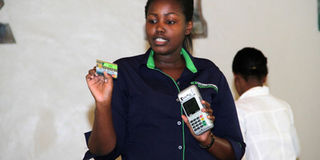Who will pocket billions from matatus?

Ms Loise Nyaga, an e-payment expert with the Kenya Commercial Bank, trains matatu owners how to use the cashless matatu payment system, during a National Transport and Safety Authority forum in Nakuru on October 22, 2014. PHOTO | SULEIMAN MBATIAH |
What you need to know:
- They raised questions over the three per cent transaction fee, which is shared between My 1963 – the owner of the payment platform – and banks that have signed the lucrative deal.
- The payment system involves passengers pre-loading money onto a plastic card that is swiped on a machine carried inside the vehicles.
- Mr Mbugua stated that although the system is designed to help the Kenya Revenue Authority get tax from the matatu industry, the matter of double taxation has not been sorted out.
Just who will benefit from the cashless matatu payment system launched last week? This is the question a section of matatu owners are grappling with after it turned out that billions of shillings will be paid to service providers.
Matatu owners who spoke to the Sunday Nation said the percentage charged as a transaction fee could amount to billions of shillings a month and accused some matatu officials and individuals close to the President of scheming to benefit from the project.
They raised questions over the three per cent transaction fee, which is shared between My 1963 – the owner of the payment platform – and banks that have signed the lucrative deal.
The financial institutions are Equity Bank, Kenya Commercial Bank, National Bank and Family Bank. The Co-operative Bank of Kenya and Commercial Bank of Africa are also expected to sign on.
The payment system involves passengers pre-loading money onto a plastic card that is swiped on a machine carried inside the vehicles.
Key interested parties who spoke on condition of anonimity said that the ownership of My 1963 is shrouded in secrecy and could be associated with some officials in the Office of the President, who invited President Uhuru Kenyatta to the Matatu Owners Association (Moa) National Delegates Council meeting on Tuesday “to silence us from raising concerns about the project”.
REMEDY TO CORRUPTION
On Saturday, Moa Chairman Simon Kimutai declined to disclose the owners of My 1963.
Instead, he defended the company and the cashless system as the remedy to corruption and speeding on Kenyan roads.
He said that stakeholders should be concerned with the benefits and not the three per cent transaction fees being levied on matatu association members.
He disclosed that a company known as Tangaza will join My 1963 as a payment system provider.
We could not reach President Kenyatta’s spokesman, Mr Manoah Esipisu, for comment.
My 1963’s website states that the card provides a safe, secure means of payment.
It also lists matatu savings and credit cooperative societies (Saccos) that have signed on to the payment system and those that have been identified but are yet to sign on.
Those that have signed on are Compliant, City Shuttle, Umoiner, Forward Travellers, Prime East, Maptra, Iska, Eastern By-pass and C-Bet. Those “coming soon” are Manchester, Metro Trans , Wawaku, Nanyuki, North Rift, South B, Wamasaa, Kilele and MWK.
CAUTIOUS IMPLEMENTATION
According to documents seen by the Sunday Nation, with a transaction fee of three per cent on gross income, the service providers can make up to Sh30 billion annually from matatu owners.
“When they agree on a transaction fee of 3 per cent without involving the investors, what are we supposed to do? They should have agreed on 1 or 0.5 pe cent fee for each transaction,” a source in the matatu industry said.
“There are more than 80,000 matatus and if all of them are on the road then you are talking about a lot of money being schemed off matatus investors,” an interested party said.
Matatu Welfare Association chairman Dickson Mbugua cautioned that the system needs to be implemented with care. He wondered why it is being rushed.
“This thing needs to be implemented with care, taking into consideration the views of all players,” he said. “All players need to have a say on what is expected of them and where to get the service.”
Mr Mbugua argued that the implementers of the system must understand that not all Kenyans have automated teller machine cards or can access the payment card.
He said: “The people with these facilities are the middle class, rich and the salaried. The rest of Kenyans deal in cash whether buying things from the shop or paying fare. For instance, how will it work in the remote villages?”
POPULAR SYSTEM
Mr Mbugua stated that although the system is designed to help the Kenya Revenue Authority get tax from the matatu industry, the matter of double taxation has not been sorted out.
“We pay advance tax for each seat. However, they claim that it is not sufficient. These issues need to be resolved before the system kicks in,” he said.
However, Moa Chairman Simon Kimutai argued that the system is popular and banks want to sign on. He observed that cash in matatus has always been a “magnet” for corrupt police officers and thugs.
“This will eliminate corruption and robberies on the routes,” he said. “Speeding by the crew to make money for themselves after attaining their daily targets will be a thing of the past.”
Passengers were to start using the system on July 1 but this has now been postponed to December 1.





